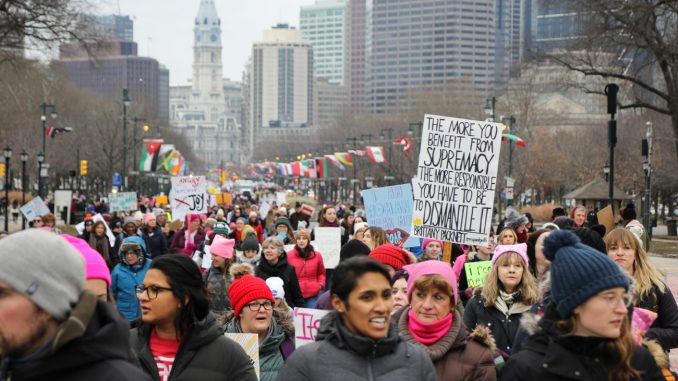
Thousands of Temple students and Philadelphians marched Saturday from LOVE Park to the Philadelphia Museum of Art for the third-annual Women’s March.
The Philadelphia Women’s March, held by Philly Women Rally, is an annual event that began after President Trump took office in 2017. Philly Women Rally is an independently-run organization that advocates for women’s rights locally.
Conflict followed this year’s march after Emily Cooper Morse, who founded Philly Women Rally, was removed from the organization amid accusations of making transphobic and racist comments. As a result, the Women’s March Pennsylvania, the local chapter of the national organization that is under fire for allegedly perpetuating anti-semitic remarks, held an additional march on Saturday.
Both marches were granted permits to protest on the Benjamin Franklin Parkway, with Philly Women Rally marching in the Art Museum area and Women’s March Pennsylvania at LOVE Park.
Camille Hernandez, a junior film and media arts major, attended the annual event for the first time on Saturday.
“It’s important for us to have the female power, to have our rights,” Hernandez said.
Marisa Gittelman, a senior theater major, has attended every march since they began.
“I attended the first one because it just seemed like if there was going to be something good that came out of this political ridiculousness, then it would be us coming together and making our voices heard more,” said Gittelman.
To address the conflict from the national chapter, Women’s March on Philadelphia dubbed inclusivity this year’s march theme. Titled “We Shall All Be Heard,” the event called for an end to gun violence, racism, anti-semitism and Islamophobia.
Speakers for the Philly Women Rally event included March for Our Lives student leaders, the Black Women’s Leadership Council and Attorney General Josh Shapiro.
“It is good to be in the city of Brotherly Love, and Sisterly Affection,” Shapiro said, prompting applause from the crowd. “I believe that no matter what you look like, or where you come from, or who you love, the rule of law applies to you. And I will fight for you every single day.”
Dawn Chavous, a member of the Black Women’s Leadership Council, told event attendees to use their voices.
“Don’t let anyone silence you,” she said. “Don’t apologize for your opinions. Stand firm in what you believe. We have to work together. We are stronger united.”
“We need to be civically engaged,” Chavous added. “We need more women on all levels of elected office and we need to hold our current elected officials accountable.”
Women’s March Pennsylvania introduced activists and organizers like Jodi Risper, Nicole Karsh and City Council candidate Sherrie Cohen.
Jacob Lubic, a sophomore accounting major who attended the march at LOVE Park, said inclusivity is important in the Women’s March.
“A lot of times when we talk about women’s rights, it’s done in a very cis-normative dialogue,” Lubic said. “It’s really important that we are more inclusive and include trans-women whenever we’re talking about women’s rights.”
Lubic held a sign that read “Support Your Sisters, Not Your Cis-ters.”
The Women’s March occurred on the 28th day of President Trump’s government shutdown and days after a federal judge in Philadelphia blocked a motion that would allow healthcare providers exemptions from covering birth control, despite a mandate for coverage under Obamacare.
Bryn Gautieri, a freshman media and communications major, said the government shutdown should be a major factor in people attending the march because of all the sectors impacted by it, like the environment. The Environmental Protection Agency has run out of funding and consequently closed due to the shutdown.
“The environment, like every aspect of the government which is currently being neglected by the president, should definitely be advocated for,” Gautieri said. “Everyone has a different meaning for this march.”
Lubic said he believes despite the march’s conflict, there was a large nod to diversity and inclusivity.
“I don’t think anyone is going to always be happy, but I think the Women’s March does a really good job of trying to be as inclusive as possible,” Lubic said. “I don’t feel like it’s as exclusive as everyone says it is. I think it’s just trying to make an inclusive statement.”
For Gautiere, the most important part of the event was standing up for women’s rights.
“We’re marching to empower other women,” she said. “To speak up and say that we will be heard, regardless of the policies that the president is currently putting in place.”



I like how you interviewed students from multiple majors to generate thoughts from all audiences instead of targeting one group.
Amazing work! Great piece and I hope I can attend the next Women’s March!